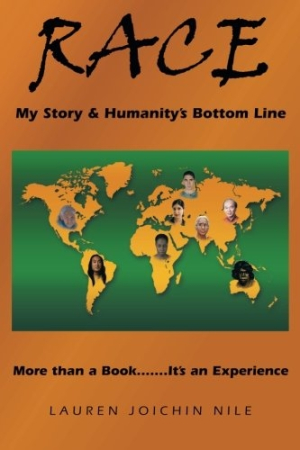
Race
My Story and Humanity's Bottom Line: More Than a Book...It's an Experience
This compelling book makes important contributions to conversations about race in America.
Lauren Joichin Nile, an accomplished attorney and speaker, debuts with Race: My Story and Humanity’s Bottom Line, the first portion of an expansive trilogy aimed at disrupting status quo thinking. Weaving her memoir into a historical analysis of the concept of race, Nile exposes the gruesome features of humanity’s adopted biases while also offering proposals for alternative ways forward.
Nile grew up in Louisiana’s Pontchartrain Park, a middle-class black neighborhood limited by de facto segregation. Though somewhat protected by her family’s adoring matriarchs, Nile experienced the horrors of segregation and the violent backlash that followed its demise. Roughly a hundred pages are devoted primarily to this autobiographical reminiscing. The author details her various encounters with discrimination and analyzes the needless divide between European Americans and Americans of color.
The remainder of Race aims to help privileged readers “walk in the moccasins of another,” first by revealing humankind’s shared biological history, then by showing how this truth was subverted in favor of late colonialist ideals. Nile roots contemporary bigotry in the period of the transatlantic slave trade, showing how an arbitrarily developed Eurocentrism became pervasive belief.
Nile’s project is extremely valuable for the underfeatured historical realities it shares, particularly those surrounding America’s own race-based past. She reminds readers of the horrors of slavery and reflects upon the almost century of segregation that followed its fall. Such sections warrant absorption.
Crimes committed against other ethnic groups, including indigenous communities and Asian Americans, are just as carefully detailed. Readers stand to gain a full picture of what being American has implied through the centuries and of which communities have been intentionally excluded from consideration. Nile paints a clear and disturbing picture of two Americas: one in which European Americans enjoy unearned privileges with limited awareness, and another in which everyone else is kept intentionally and systematically at the margins. Recollections of the GOP’s Southern Strategy are of particular relevance, as are statistics surrounding the reemergence of biased language and behavior following Barack Obama’s election. Related conclusions are disconcerting, and the implicit call to action is compelling.
Formatting anomalies prove to be the biggest hurdle. Nile is given to bolding words within her paragraphs, and resultant emphasis does not always seem necessary. Links to supporting articles and videos are included in the body of the text throughout, giving its pages a multimedia feel, though this limits full reader engagement to the e-book format. A later chapter, which imagines an America in which the roles of people of color and European Americans are reversed, saturates previously accepted assertions with ineffective hypotheticals.
In all, Nile’s book is a nuanced survey of racism and the shared humanity it covers up. She writes of opportunities lost because of intentional oppression with poignancy, and her inclusion of contemporary instances of institutional racism lends the project particular exigency. Race, which is both electrified by Nile’s personal revelations and bolstered by its careful historicity, stands to make important contributions to extant conversations about race in America.
Reviewed by
Michelle Anne Schingler
Disclosure: This article is not an endorsement, but a review. The publisher of this book provided free copies of the book and paid a small fee to have their book reviewed by a professional reviewer. Foreword Reviews and Clarion Reviews make no guarantee that the publisher will receive a positive review. Foreword Magazine, Inc. is disclosing this in accordance with the Federal Trade Commission’s 16 CFR, Part 255.
